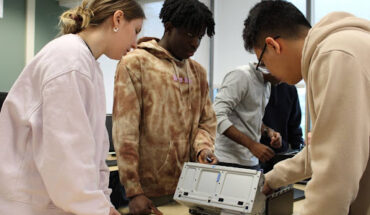TEDXGMU ROSE TO PROMINENCE IN THEIR FIRST EVENT YEAR
By Basma Humadi, Staff Writer
TEDxGeorgeMasonU came back with a new “heartbeat” in their first event of the year. After much discussion regarding the logo for this year’s TEDxGeorgeMasonU event, the TED committee and its co-directors Rohma Hassan and Aisha Sharfi decided on “heartbeat” to go with their theme of “Revival.”
“It was simple but it has a lot of meaning,” Hassan said.
Since TEDxGeorgeMasonU was dormant during the 2015-16 school year, Revival became a fitting theme for marking the comeback of this year’s conference.
Intended to match the spirit of their theme, the heartbeat exemplifies the continuing beating force that persists despite its hardships.
TED, standing for Technology, Entertainment, and Design, is an organization known for hosting conferences and guest speakers. Staging these conferences are meant to be an engaging experience as speakers are encouraged to discuss innovative “ideas worth spreading,”- as their slogan says.
The event took place Sunday, September 10, from 10 a.m to 2:20 p.m. All the speakers at TEDxGeorgeMasonU were Mason professors and faculty: S-CAR professor Dr. Richard Rubenstein, INTS associate professor Dr. Julie Owen, senior scholar at Mason’s Center for the Advancement of Well-Being Dr. Beth Cabrera and research assistant professor at Mason’s College of Science Dr. Feras Batarseh.
There were musical performances by Mason students Brian Bui and Lyndsay Mikalauskas, members of Music Production Club at Mason, as well.
Dr. Richard Rubenstein: “How to Resolve Destructive Conflicts”
Rubenstein, former lawyer, political scientist, and professor at The School for Conflict Analysis and Resolution advocated that in order to prevent and resolve violent conflicts, we, as a whole, need to understand conflicts better.
“A major obstacle in getting started in Conflict Resolution is the mentality of people who are in a conflict, or who have had taken sides,” said Rubenstein. “I call it partisan moralism.”
Partisan moralism, Rubenstein argues, is how each party involved in a conflict perceives themselves in a positive light and views the opposing party as less-than.
“If we don’t learn to overcome taboos that are used to sanctify violence producing systems, we’ll never be able to eliminate the violence they produce,” said Rubenstein.
The structural forms of thinking which influence the way conflicts are perceived, is a bad habit
no one is immune from. Understanding that fact and working to change that is a big part of resolving and preventing conflict.
“We need to help ourselves and our brothers and sisters,” said Rubenstein.
Brian Bui, Performance by Music Production Club
Stepping into the footsteps of heartfelt singers among the likes of Sam Smith or Ed Sheeran, Bui performed all original songs on guitar as a singer-songwriter.
The four songs he performed were: Rollercoaster, Fickle, Wanna Get to Know You and Never Felt Like This.
“How Will I know What’s Really Good for me?// I Guess I’ll just have to wait and see// Well, I’m Tryin’, I’m Tryin’//” sings Bui.
Dr. Julie Owen: Does Who You Are Affect How You Lead? The Roles of Identity, Capacity, and Efficacy in Leadership
Having leadership skills is important and something anyone can develop. It’s more than just outwardly guiding and directing others, but there are theories and practices that can help develop a person’s skills.
Yet, statistically, women do better at understanding theories and practices of leadership, but many of them do not feel confident enough to label themselves leaders. This then leads to the question: how does a person build the confidence for leadership?
Associate Professor of Leadership and Integrative Studies in the School of Integrative Studies, Dr. Julie E. Owen, discussed this ongoing dilemma and what can be done about it.
The need to see people who look like us represented, to try out leadership in low-risk activities, to understand constructively how people view our skills and to understand high stress environments each affect our esteem and can help to develop efficacy in leadership.
“If we don’t see people around us who look like us we might have self-doubting beliefs about leadership,” said Owen.
Developing leadership stretches far more than attending training workshops or practicing theories. It’s also something internal a person has to feel.
“Leadership is not just teaching people about the knowledge skills and theories, but we also have to deal with issues of identity, issues of capacity and issues of efficacy for leadership,” said Owen.
Dr. Beth Cabrera: How Focus Builds Well-Being
Before becoming the author of “Beyond Happy: Women, Work, And Well-Being” and senior scholar at Mason’s Center for the Advancement of Well-Being, Cabrera lived in the suburbs of Madrid, Spain and shared how it influenced her outlook on building well-being.
“What I’ve learned is that our well-being is up to us,” said Cabrera. “It depends on what we pay attention to, what we focus on.”
She noted that our relationships with others, and the strength of them, are the number one factor that affects our well-being.
“A well-known Harvard study of adult development that tracked over 700 men for over 75 years found that those who are more socially connected were happier, healthier, and live longer,” said Cabrera.
Part of giving more meaning to our lives is focuses on and developing our social connections and our relationships with others. Things like small deeds, focusing on three good things that happening in your day or spending money on others can significantly increase our well-being.
“Our lives are richer and happier when we’re fully enjoying our present,” said Cabrera.
Lyndsay Milkalauskas, Performance by Music Production Club
Singer-songwriter and guitarist Lyndsay Milkalauskas did live performances of songs, which included: “Space,” “Perpetual,” “Mechanical” and “60 Milligrams.”
Milkalauskas gave a soulful performance and fit Mason’s TED theme of Revival, as her songs centered on healing, mental illness, sexuality and understanding parts of herself.
“There was a moment in time//You took a life that was mine//” sings Milkalauskas. “There was a beacon of light//”
Dr. Feras Batarseh: A Day in the Life of a Federal Data Point
Batarseh is a research assistant professor at the College of Science with expertise ranging from Artificial Intelligence (AI) to Data Science.
He argued that Federal Agencies are way behind on gathering and working on data files and advocated for empowering and transforming government to change.
“Data is the new order,” said Batarseh. “I invite you all to join our pursuit in transforming from a government of bureaucracies to a government of exceptional intelligence and data driven decision-making… It’s a difficult challenge, but it’s a compulsory one.”




